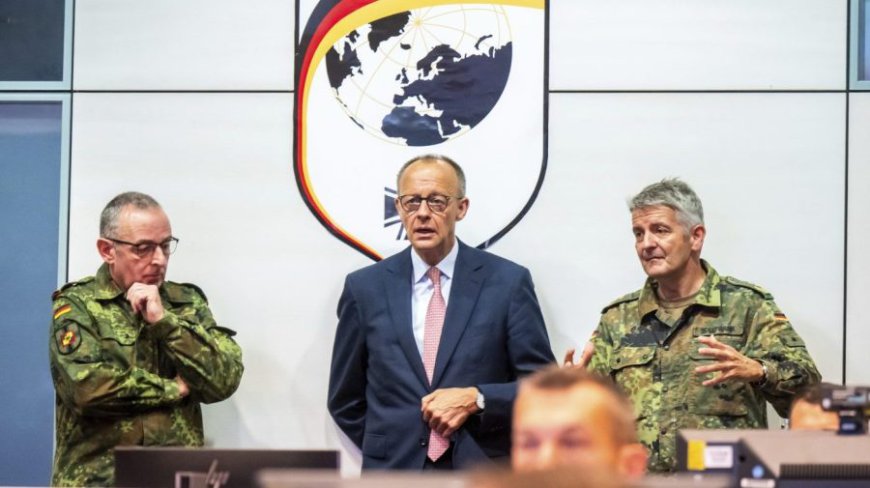Germany promised to double defense spending — now it must deliver
Chancellor Merz may find it difficult to maintain the generous social welfare regime that Germans have benefitted from for decades.

During the final two decades of the Cold War, many observers considered the West German military, the Bundeswehr, to be the most capable land force among the European NATO allies. Highly professional and extremely well trained, the German land forces, like the entire German military, benefitted from defense expenditures that by 1988 amounted to more than 3 percent of the country’s GDP. And with an economy that was the largest in western Europe, West German defense spending was greater than that of all other NATO members, apart from the U.S., the U.K. and Turkey.
The end of the Cold War resulted in a precipitous decline in defense expenditures on the part of a now-united Germany. Faced with the need to integrate the population of the former East Germany into its extremely generous welfare system, and with no clear threat to its security, Berlin’s spending dropped below 2 percent in 1992 and continued to fall until it reached a low of 1.07 percent in 2005. The following year, at its Riga summit, NATO formally agreed that member states would commit to spending 2 percent of GDP on defense. German spending rose that year — but only to 1.2 percent.
The paucity of German spending on defense manifested itself in the increasingly poor state of German military readiness. By 2010, the German Army’s once-vaunted Leopard tanks were suffering from low availability, as significant numbers were in storage or maintenance. The Air Force’s Tornado and Eurofighter aircraft were suffering from shortages of spare parts. The German fleet was aging, with few replacements and limited deployments.
Secretary of Defense Robert Gates likely had Germany in mind when in 2011 he told his NATO colleagues that “if current trends in the decline of European defense capabilities are not halted and reversed, future U.S. political leaders — those for whom the Cold War was not the formative experience that it was for me — may not consider the return on America’s investment in NATO worth the cost.”
Even Russia’s seizure and annexation of Crimea in 2014, and NATO’s reaffirmation of its 2 percent goal at the Wales summit that year, hardly made an impression on German defense spending. Indeed, it took five more years for defense spending to rise to just slightly above 1.25 percent. Only after Russia invaded Ukraine in February 2022 did the trajectory of German spending begin to change.
Five days after the Russian invasion, German Chancellor Olof Scholz — in what came to be called his “Zeitenwende” or “turning point” speech to the Bundestag — announced that his government would “set up a special fund for the Bundeswehr” with “a one-off sum of 100 billion euro for the fund. We will use this money for necessary investments and armament projects.” He added that “we will now — year after year — invest more than 2 percent of our gross domestic product in our defense.” Germany indeed hit the 2 percent mark early in 2024 and it will reach 2.4 percent this year.
Scholz’s successor, Friedrich Merz, elected in May after the Scholz government was defeated in the December 2024 election, announced an even sharper jump in German defense spending, thanks to a constitutional reform that will allow government borrowing above the previous rate of 0.35 percent of GDP. Three weeks ago, Merz committed Germany to more than double its defense spending by 2029, thereby reaching NATO’s new target of 3.5 percent of GDP ahead of almost all the other European NATO allies.
Merz’s initiative is certainly welcome, but it is not clear that he will be able to follow through on his promises. The German public remains deeply concerned about Russia’s ongoing aggression against Ukraine, and thus far does not appear to have responded negatively to the government’s plans. Nevertheless, even with less restrictive constraints on government borrowing, Merz may find it difficult to maintain the generous social welfare regime that Germans have benefitted from for decades. Any cutbacks or modification of those benefits could spur a popular backlash against the planned defense increases.
Moreover, the fact that Germany is expected to continue to purchase U.S. defense products — currently totaling at least $15 billion — at a time when America is extremely unpopular throughout western Europe may intensify that backlash.
Whether the fledgling Merz government will have the fortitude to withstand popular pressure over the next several years is an open question. Hopefully it will, because Germany, once NATO’s fulcrum in central Europe, will remain critical to the credibility of the alliance’s deterrent against a Russia whose appetite for swallowing up its neighbors continues to appear insatiable.
Dov S. Zakheim is a senior adviser at the Center for Strategic and International Studies and vice chairman of the board for the Foreign Policy Research Institute. He was undersecretary of Defense (comptroller) and chief financial officer for the Department of Defense from 2001 to 2004 and a deputy undersecretary of Defense from 1985 to 1987.
What's Your Reaction?
























